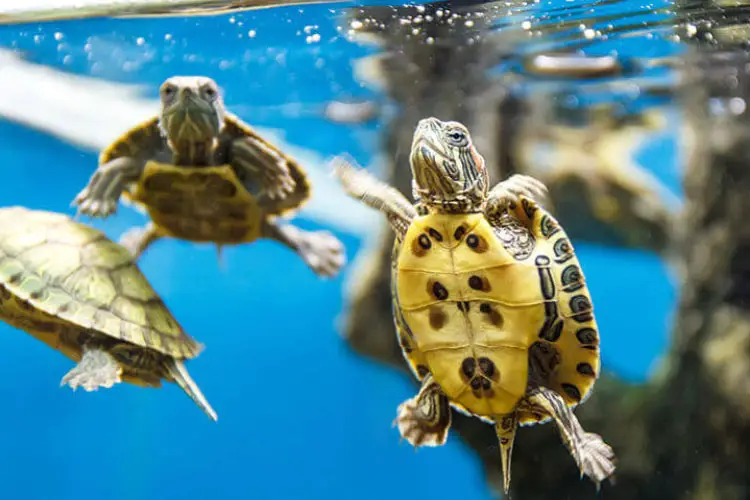Why Is My Baby Turtle Not Eating? How To Make It Eat?
You’ll find this guide helpful if you’re scared and stressed over your baby turtle not eating. It is okay to feel worried and wonder what it means if your baby turtle doesn’t eat.
Why is my baby turtle not eating? Your baby turtle is not eating because of an underlying illness, or they don’t like the food you feed them. Other reasons young turtles may fail to eat include changes in habitat, inappropriate lighting, and unsuitable temperatures.
By the time you’re done reading this article, you’ll have discovered deeper details about why your baby turtle isn’t eating, what to do if your pet refuses to eat, and other helpful info.
Why is my baby turtle not eating?
Contents
Without wasting a second, let’s go into full details about why your baby turtle may refuse to eat…
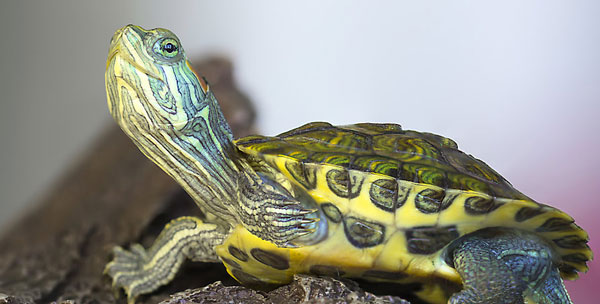
Illness
If your baby turtle refuses to eat, one of the top reasons could be that they’re sick. You can easily tell if your young turtle is sick as a turtle owner by looking out for key symptoms of a sick turtle.
These include discharge from the nasal cavity, wheezing, sneezing, and breathing difficulties (swollen eyes and lethargy are further proof of breathing problems). A turtle suffering from respray illness will hardly eat.
Additionally, you should inspect the fecal matter at the tank’s bottom. Lack of excretion means they could be suffering from constipation. The presence of worms in the feces means a parasitic infection.
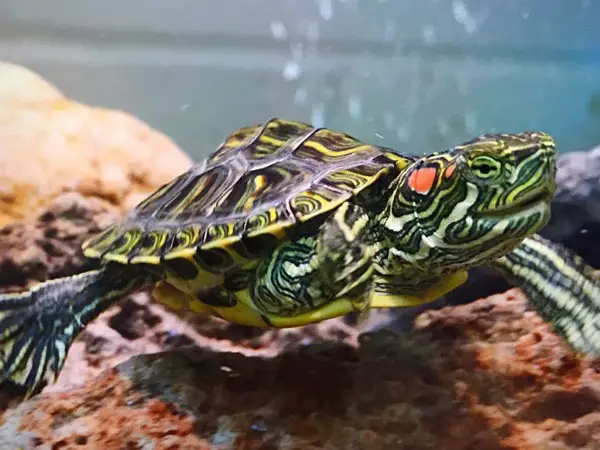
You may also want to inspect the pet for shell discoloration caused by vitamin A deficiency.
TIP: If you suspect your turtle is ill, consider taking it to the vet for examination and treatment of the underlying illness before it’s too late. If you suspect your pet has a parasitic infection, have a vet examine its feces for parasites and pathogens that might be causing it not to eat.
Diet
The type of food you’re giving your young turtle could also be the reason it refuses to eat.
If you’ve been feeding your pet the commercial turtle pellets and they don’t seem to eat, try other types of foods, e.g., live animals or bright-colored fruits and veggies.
Or simply try a variety of food to see what your young turtle likes.
You can add to their feeding areas mealworms, earthworms, snails, and small fish. Try mixing up their foods with the pelleted food to see if they’ll eat them.
Change of environment
Baby turtles easily get stressed due to a change in environment. This explains why your pet may refuse to eat if you just brought them home from another environment.
These young pets are usually not used to changing environments or being handled frequently. They will easily feel unsettled if they undergo such.
Your pet will likely go slow food intake but will start eating as they adapt to the new environment.
NOTE: If you took your baby turtle from the wild or outdoors, we suggest taking it back. You might not know this, but taking a turtle from the wild is illegal because it’s almost impossible to feed them correctly. They’ll end up suffering for weeks and eventually die of starvation.
Unideal temperatures
Subjecting your baby turtle to unsuitable temperatures in its habitat may also cause them to stop eating. These young pets have slightly different temperature requirements compared to other aquatic animals.
If your baby turtle is living in a too cold habitat, it would be unable to digest food and, therefore, won’t eat. Likewise, a turtle in a too-hot environment will suffer from heat stress and won’t eat.
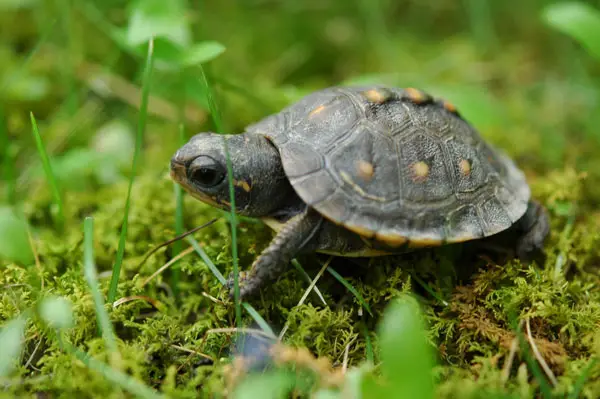
Make sure you have your tank temperatures set correctly for your baby turtles (though this will depend on the species of turtles you own).
For instance, baby red-eared slider turtles require around 80 to 85 degrees Fahrenheit. In comparison, baby box turtles will go with 70 to 80 degrees Fahrenheit.
Poor lighting
Lack of UVB light source or exposure to direct sunlight can also affect your turtle’s appetite. That’s why as a pet owner, you’re always recommended to ensure you have the appropriate UV bulb lighting in place for your turtle and at the right distance from their basking platform.
Besides the loss of appetite, the lack of enough UV lighting or natural sunlight will make it hard for your pet to metabolize calcium properly, leading to calcium deficiency diseases like metabolic bone disease (MBD).
Time of the day
Baby turtles are usually active during the first half of the day. So, if you’ve been feeding your pet in the evening, you can try changing the schedule, and you may be surprised that your pet starts feeding well again.
To be more specific, consider feeding them in the morning. They tend to feed much better at this time of the day, with more cravings and energy. They’ll mostly spend the later hours of the day in sluggish mode, so you should avoid feeding them at those hours.
What do you do if your baby turtle won’t eat?
The best thing you can do in a “baby turtle won’t eat” situation is to understand the reason behind this unusual behavior. Only then will you be able to determine the right course of action and hopefully get your pet to eat.
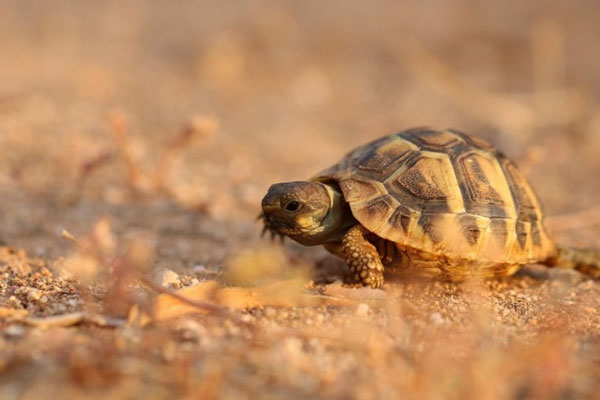
Here are some additional helpful tips you can use to make your young turtle eat:
- Clean the turtle tank: The young and adult turtles like staying in fresh water. We suggest cleaning their tank every week. Ensure their water is clean and aerated. These measures will help keep them happy and healthy and motivate them to eat more when in this state.
- Set the tank lamp correctly: make sure the heat is not too high or too low, as it can affect how they eat. Use a thermometer to help you maintain the ideal temperatures for your turtle tank.
- Use the separation method: if you have two baby turtles of the same species in one tank, they may fail to eat due to fearing each other. Try separating them to see if they’ll feel comfortable and start feeding.
- Adjust the turtle diet and feeding routine: your baby turtle may be a picky eater, which could be another reason for not eating. Try introducing new food items to see if they help solve the situation.
You may also want to mix up their food instead of giving them one type of food. Try feeding the turtles in the morning hours (i.e., 4:30 am or 5:30 am, or as close to down as possible) when they’re hungry to see if it helps.
Also read: Why Does My Turtle Tank Smell?
How long can baby turtles go without eating?
A baby turtle can’t go a day without eating. “Baby” here means a young turtle below the age of 6 months. On the other hand, an older turtle (6-12 months old) can go up to a day without feeding.
This means baby turtles need to feed every day, and are unlike adult turtles, who can survive for up to 2 or 3 days without eating.
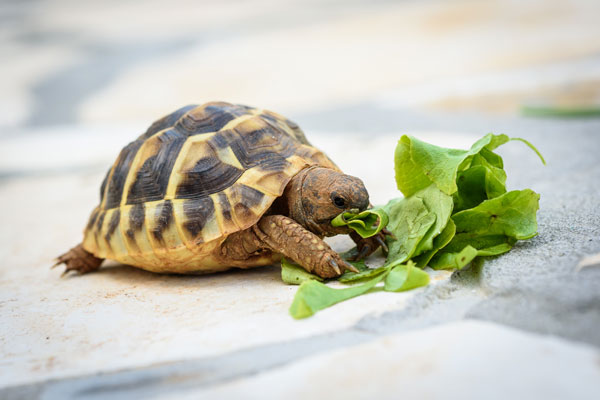
Remember, turtles can generally fast for a few days after taking a heavy meal. So if you overfed your baby turtle and it doesn’t want to eat, there you have your culprit—giving them too much food!
How do you force-feed a baby turtle?
These tips and tricks will help you get your turtle, so they don’t go for days without eating:
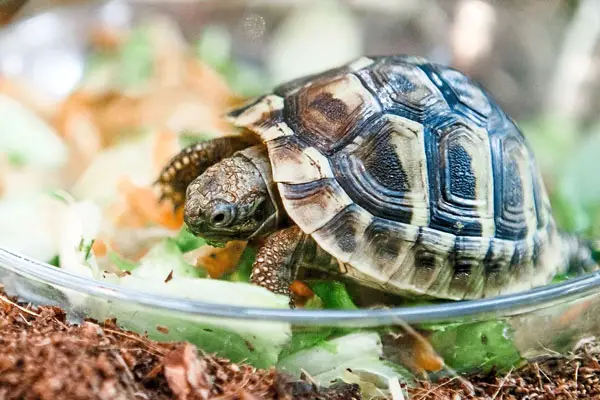
Give them a favorable environment
To make a young turtle eat, even if they don’t want to, you’ll first need to ensure they have the ideal living conditions. Check that the temperature is ideal and they’re receiving adequate UVB light.
Also, check that they don’t have any signs of illness. If you think your turtle is ill, take it to an exotic vet asap for diagnosis and treatment.
Entice them into eating
Next, you should try enticing your young turtle to eat by giving them live foods, e.g., crickets, earthworms, mealworms, waxworms, slugs, snails, etc. Mix up their pellets with these live foods to see if they’ll get to eat them.
You can also try offering brightly colored fruits and veggies since they’re attracted to them. Examples include tomatoes, strawberries, rose petals, watermelon, papaya, etc.
Try syringe feeding
This is especially helpful if you have a sick turtle or a turtle with no appetite. Instead of watching your pet refuse to eat and die after weeks
The vet educational video below shows the process of feeding a turtle that won’t eat. Though this video focuses on a read-eared slide, it will work for just any other baby turtle species.
How often should a baby turtle eat?
You should feed your baby two to three times daily. This is an ideal frequency to ensure you don’t starve or overfeed your pets. And will help keep them alive and healthy
Leave the food inside your turtle’s tank for about half an hour, then remove the uneaten food to ensure it doesn’t cause the tank to smell.
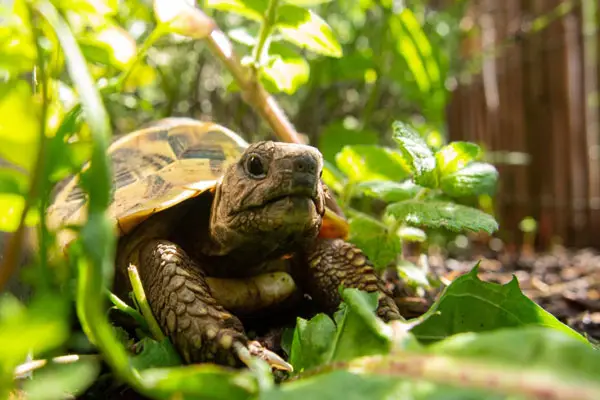
You can feed the leftover food to your pet later in the day.
What happens if your baby turtle doesn’t eat?
If your baby turtle doesn’t eat, they risk dying due to starvation. Lack of food will mean the young turtles don’t get the essential nutrients their body require for growth.
This will easily deteriorate their health and increase the chances of illnesses the more they go without food.
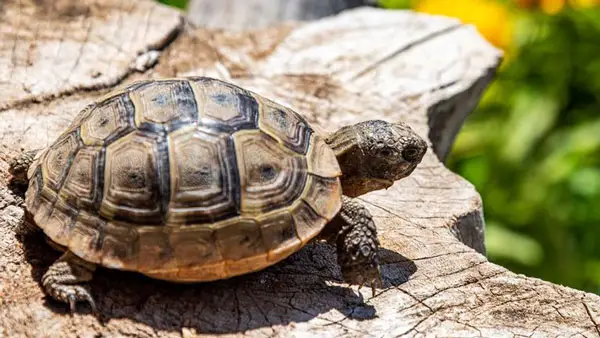
If the turtle refuses to eat for a few weeks, it will eventually die of starvation.
FAQs:
You should feed your baby turtle one cup of food every day. Instead of feeding them all the food at once, separate it into 2-3 portions of food and feed them 2-3 times a day. Sticking to this rule is important to avoid overfeeding your turtle and subjecting it to various health risks.
It is easy to overfeed your turtle unknowingly, but we recommend against it. It is safer to underfeed your turtle than to overfeed it. The latter can lead to serious health issues like obesity and hepatic lipidosis (fatty liver disease). It will result in shell pyramiding, which goes against healthy shell development in baby turtles.
Related: Why Is My Turtle Sleeping So Much?
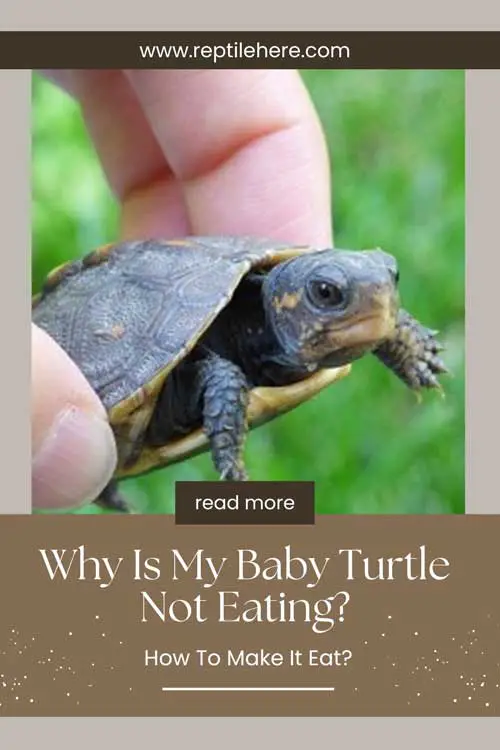
Final Word
We understand that your baby turtle failing to eat can be stressful, and you may want to do anything to get them to eat. Before you take any steps, try to understand why they don’t want to eat. This will make it easier for you to decide the steps to take to get them feeding.
We have discussed the most common reasons baby turtles fail to eat and helpful tips for making them eat in the above guide. We hope this information will help you find the problem and solve it, so your pet can start eating and stay healthy (and happy)!

